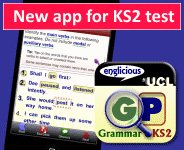Glossary: interrogative clause
Explanation
A clause type which is characterised by Subject-verb inversion and/or a fronted wh-phrase, and which is usually (though not exclusively) used to ask questions. Examples are Have you looked at this article? and Who told you that?Englicious contains many resources for English language in schools, but the vast majority of them require you to register and log in first. For more information, see What is Englicious?

